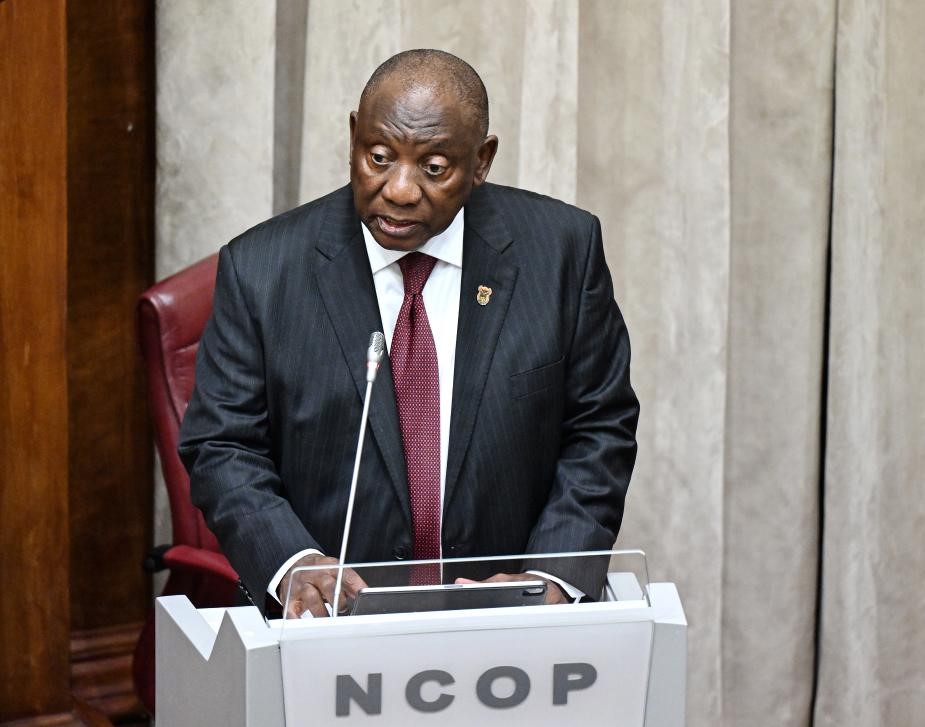The Economic Freedom Fighters and African Transformation Movement want the Constitutional Court to overrule a vote by Parliament in late 2022 that saved Ramaphosa from impeachment hearings …reports Asian Lite News
Two South African opposition parties asked the country’s top court Tuesday to revive impeachment proceedings against President Cyril Ramaphosa over a scandal where more than half a million dollars in cash was stashed in a couch at his ranch and then stolen.
The leftist Economic Freedom Fighters and African Transformation Movement want the Constitutional Court to overrule a vote by Parliament in late 2022 that saved Ramaphosa from impeachment hearings.
Ramaphosa’s African National Congress party used its parliamentary majority to stop an impeachment vote by lawmakers. But the opposition parties say Parliament did not fulfill its constitutional duty to hold the president to account after a preliminary investigation found some evidence of misconduct by Ramaphosa and recommended a full probe.
The opposition parties want a full parliamentary investigation.
Ramaphosa was cleared of wrongdoing by financial authorities, by a public watchdog and by police after a two-year criminal investigation.
The case threatened Ramaphosa’s leadership after it was revealed in June 2022 that around $580,000 in U.S. banknotes was stolen from a couch at his game farm. The theft happened in early 2020 but came to light two years later.
Ramaphosa was accused of money laundering and breaching foreign currency laws, and of covering up the theft. He said the money came from the legitimate sale of animals at his ranch but has not explained why it was hidden in a couch.
The opposition parties pushed that question again at Tuesday’s court hearing.
“There needs to be an explanation,” said Anton Katz, a lawyer for the ATM party.
Ramaphosa’s long-ruling ANC lost its parliamentary majority in May’s election. Any revival of impeachment hearings could be risky for the leader of Africa’s most advanced economy, who was reelected for a second term in June with the help of coalition partners. However, the EFF and ATM are small parties and would ultimately need support from others who joined the ANC-led coalition government to impeach Ramaphosa, which is seen as unlikely. The Constitutional Court typically takes weeks and sometimes months to deliver a ruling.
‘We are committed to ending poverty ‘
South Africa is committed to ending poverty in the country through collective actions and far-reaching social and economic reforms, said President Cyril Ramaphosa.
He remarked while delivering his annual address to the National Council of Provinces (NCOP), the upper house of parliament, in Cape Town, the legislative capital of South Africa.
The address and the debate on it were held under the theme “Dedicating Our Efforts towards Reducing Poverty and Tacking the High Cost of Living.”
“Like slavery and apartheid, poverty is not natural. It is man-made and it can be overcome and eradicated by the actions of human beings,” Ramaphosa declared, invoking the words of Nelson Mandela. He noted that poverty in South Africa has deep roots, including centuries of colonial and apartheid humiliation, dispossession and exclusion.
“The end of poverty and inequality in South Africa therefore requires nothing less than the fundamental social and economic transformation of our country,” he said.
Ramaphosa also outlined the government’s progress in lifting millions of South Africans out of absolute poverty. According to him, in 1993, 71 per cent of South Africans lived in poverty, by 2010 the poverty rate had dropped to 61 per cent and in 2020, it was at 56 per cent.
Ramaphosa acknowledged that challenges remain, given nearly a quarter of the population experiences food poverty, and unemployment, particularly among young people, persists as a pressing issue.
To address these challenges, “our focus is on the actions we must take — boldly and with urgency — to implement our electoral mandate,” he said. “Our actions must make a real difference in people’s lives now. Our actions must also build an inclusive economy that will continue to reduce poverty into the future — and ultimately eradicate it.”
According to the president, key reforms are underway in strategic sectors such as energy, water, telecommunications, and transport. For example, he highlighted the restoration of commuter train services, which he said is the most affordable mode of transport, as part of efforts to ease the financial burden on low-income households.
Ramaphosa specifically emphasised the importance of education, describing it as “the most powerful instrument we have to end poverty.” “By investing in the skills and capabilities of young people, we will be able to break the cycle of poverty that is handed down from one generation to the next.”
He also noted that as South Africa assumes the G20 presidency in December under the theme “Solidarity, Equality and Sustainability,” the country will use the opportunity to advocate for global partnerships to achieve Sustainable Development Goals, ensuring “no one is left behind” in the fight against poverty.
“Poverty, unemployment and inequality are so pervasive and so persistent that we sometimes fear we may never overcome them,” said Ramaphosa. “And yet, we overcame apartheid. We overcame slavery and colonialism. Through our collective actions, we will be able to end poverty in our country.”
ALSO READ: Policymakers seek ways to end learning poverty in Africa

